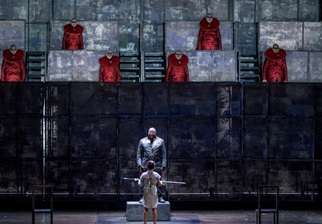|
Back
Torture and Transcendence in Korngold’s Das Wunder der Heliane Albany
Annandale-on-Hudson (Sosnoff Theater, Fischer Center)
07/26/2019 - & July 28, 31, August 2, 4*, 2019
Erich Wolfgang Korngold : Das Wunder der Heliane, opus 20
Ausrinė Stundytė (Heliane), Alfred Walker (The Ruler), Daniel Brenna (The Stranger), Jennifer Feinstein (The Messenger), Nicolas Brownlee (The Porter), David Cangelosi (The Blind Judge)
Bard Festival Chorale, James Bagwell (Chorus Master), American Symphony Orchestra, Leon Botstein (Conductor)
Christian Räth (Director), Esther Bialas (Set and Costume Design), Thomas C. Hase (Lighting Design), Catherine Galasso (Movement Direction)

A. Walker (© Stephanie Berger)
Bard SummerScape is exploring the world of Erich Wolfgang Korngold, a composer best known for his Hollywood film scores. He was so good at writing for film that he could work on any movie he chose.
Korngold’s opera Das Wunder der Heliane premiered successfully in Hamburg in 1927. Lotte Lehmann sang the title role. This followed his critical success with Die tote Stadt, a work more frequently mounted. Korngold considered Heliane his finest work. Yet it is seldom performed. The production at Bard’s SummerScape is its United States premiere.
Richard Strauss, after reading compositions Korngold wrote at age 11, was astonished. “The assurance of style, this mastery of form, this...expressiveness.” Seventeen years later, it still astonishes to find the score for Heliane masterfully composed, with both a loveliness reminiscent of Strauss himself and new ventures into dystopian harmonies and melodies. Set in an unspecified location at an unspecified time, the emotional arc moves from torture to transformation.
The story of Heliane, a woman who refuses to succumb to her husband, The Ruler, and who falls in love with The Stranger delivering joy to the oppressed subjects, is amazing. The Stranger is to be executed for his popularity with the populace. Dressed in an orange suit we have come to associate with at Abu Ghraib, Daniel Brenna radiates The Stranger’s goodness in his bright tenor. He is momentarily redeemed when The Ruler catches his nude wife in The Stranger’s prison cell. The Stranger is to live long enough to bear witness to Heliane’s adultery at trial.
Heliane’s strip before the prisoner echoes Salome’s dance in Strauss’ opera. The composer also suggests some of the kinkiness of Salome’s desire, as sweet as Heliane is. Heliane’s music is soft and filled with the lighter woodwinds and chiming percussion. Ausrinė Stundytė sings the title role with a pleasing kindness colored by rich tone lusters.
The focus of the drama is on Heliane, her husband and the prisoner. Feelings are expressed in the musical lines, both sung and orchestrated. While death hangs over every scene, we do not fear for the principals. None of them seem weak enough to quash. In portraying their strength, the composer has laid the groundwork for transcendent moments to arise.
Curiously the tale feels also like a retelling of Christ’s death on the cross. A sword with crossed hilt sits on center stage for much of the production. Heliane like Mary Magdalene seduces The Stranger, but clearly by invitation. Whether the characters are dead or alive is left indeterminate. Christ of course is ever present in spirit after his death and resurrection.
Christian Räth has taken on a tough directing job. Although there is emotional drama at almost every moment, there is little action. The orchestra provides the most engaging movement forward. Leon Botstein at the helm conveyed his enthusiasm for the work in each note he drew forth.
Räth is immeasurably assisted by Esther Bialas, the set and costume designer. Six units smoothly moved to create a prison, a courtyard and a courtroom, providing action. These units consisted of open stacked perches and stairways, which offered an opportunity to create memorable images. Six judges with huge red collars bend forward, arms akimbo and eyes terrifyingly fixed on the proceedings. The Ruler’s desire for his virgin wife and his frustration and fury that she will not be his are transmitted from his throne with the passion of Othello. Alfred Walker sings The Ruler role with terrifying threat. It was difficult not to imagine Heliane strangled and smothered.
Thomas C. Hase’s lighting also added drama, focusing on shocked arms and pleading gestures to color the scene. Costume colors were also enhanced by light. Catherine Galasso was inspired by the music to move dancers during the prelude to the third act, a spectacular musical and dramatic scene.
The supporting cast was first rate. David Cangelosi as the blind judge gave a stentorian hint that Justice might be rendered. Jennifer Feinstein gave a wicked and yet seductive cast to the melodic lines of The Messenger.
Heliane was written in no specific time period. No specific location also creates a sense of timelessness. The impact of terror on individuals and the populace is felt strongly in the story and music. Other worldly rewards may no longer tempt in the 21st century, but the orchestra gave us plenty of hope as The Stranger and Heliane rise to immortality. The opera afternoon was full of joy as we listened to gorgeous music sung by a talented cast.
Susan Hall
|